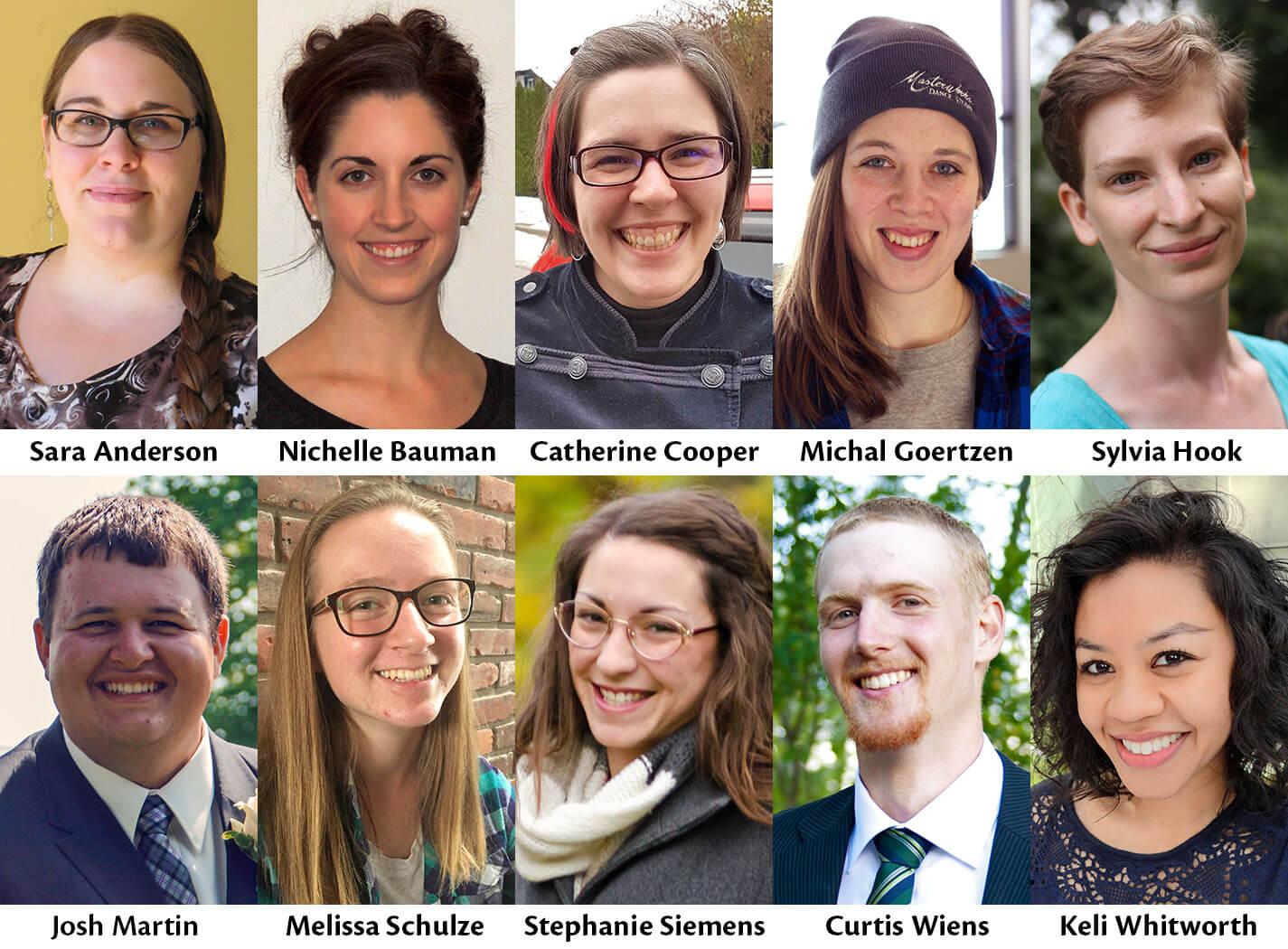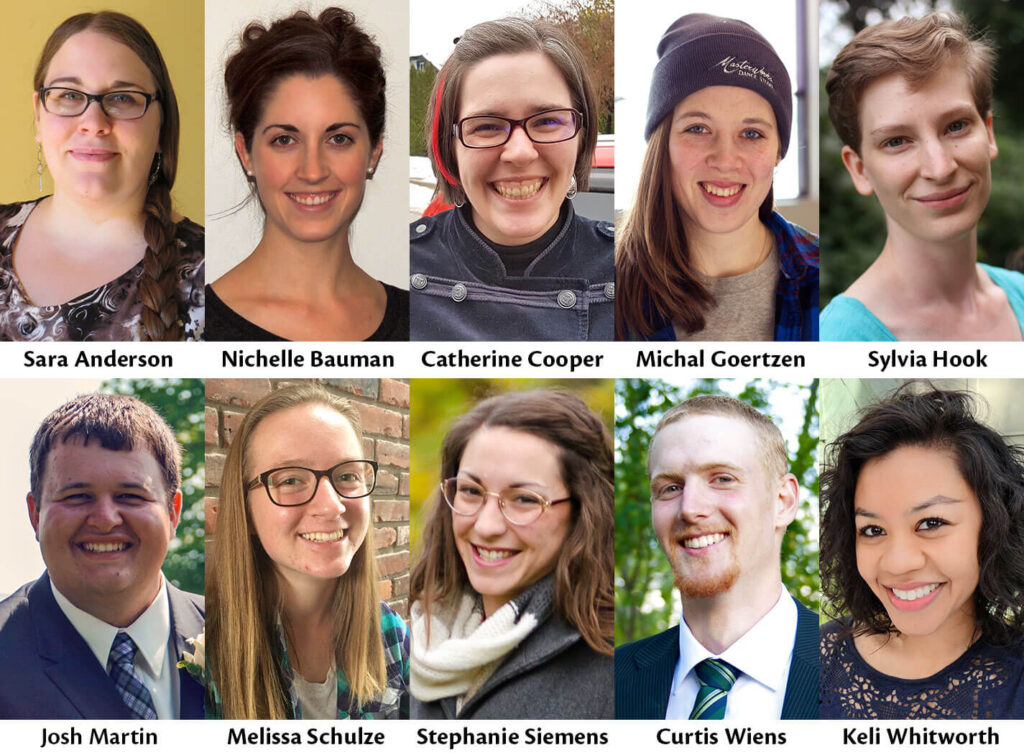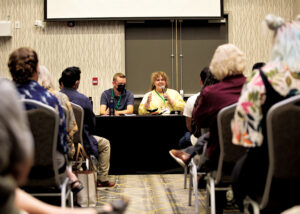We asked and you responded.
This past fall, Canadian Mennonite put out a call to readers. We wanted to hear about the young adults who are making a difference in your community—the emerging Mennonite leaders from across Canada who care about and support the church.
We asked that you suggest people who are 30 years old or younger; who are active in a Mennonite Church Canada congregation; who possess a gift or skill that benefits the church or community; who can articulate their faith and how they have experienced God; who show care for others through acts of service or volunteering; and who have not been profiled in Canadian Mennonite in the past three years.
What follows are the 10 people Canadian Mennonite chose from the nominations we received. A woman working towards indigenous-settler reconciliation, a dancer who works with inner-city youth in Winnipeg, a musician who writes new songs for special occasions at her church, and a youth worker passionate about ministry in Toronto, are just a few of the people you will read about in our inaugural 10 Under 30 list. Alas, no one was nominated from Alberta, the only area church not represented.
They are all faithful Christians doing significant work that you have not read about in these pages before. They are also an indication that the church is in good hands.
In alphabetitcal order by last name, our 10 Under 30 are:
1. Sara Anderson, Ottawa
For Sara Anderson, following Jesus Christ means amplifying the voices of the marginalized and working for social justice through nonviolent activism.
Over the last several years, the 25-year-old has contributed to the movement for reconciliation between indigenous and settler cultures in Canada. She teaches, writes, leads worship, develops programs and campaigns, and does community organizing.
Anderson has developed these skills in a number of contexts, including through her master’s degree at Carleton University, where she focussed on Anabaptist-indigenous relationships in Ontario; her work as the reconciliation education project coordinator under the Indigenous Rights program at Kairos; as a member of Mennonite Central Committee (MCC) Ontario’s board; and at Ottawa Mennonite Church, her home congregation.
Anderson was a member of the committee that brought the resolution on the Doctrine of Discovery to MC Canada’s Assembly 2016.
Her reconciliation work is personal. Anderson’s father’s background is indigenous. He was part of the “Sixties scoop,” in which thousands of indigenous and Métis children were taken from their homes and put into foster care or were adopted into white families.
“His story fits within the larger narrative of the broken relationship between indigenous peoples and settlers in Canada, and it was this realization that sparked my thirst for knowledge about these issues,” Anderson told her congregation in a sermon she gave last year.
Anderson’s work has not always been welcomed and encouraged, and she has identified and experienced part of intergenerational cycles of trauma and abuse. At the same time, she has not let this discourage her.
“I’m pretty hopeful,” she tells Canadian Mennonite. “I get to have a lot of interactions in the work that I do with a lot of people around the country, and I’m continuously encouraged by how many people are interested and want to be involved in this reconciliation journey.”
2. Nichelle Bauman, Durham, Ont.
A lifelong musician, Nichelle Bauman leads the worship and music ministry at Floradale Mennonite Church. The best part of the quarter-time position is when someone approaches her after church and tells her that the songs she chose helped them to worship well. “That’s really meaningful to me,” says Bauman, who turns 26 this month.
Bauman often writes new songs for special occasions. After a farmer from her congregation died and the family asked Bauman to sing at his funeral, she wrote a song about the man with the refrain, “You gotta know that my soul is at home.”
“I didn’t know him super well, but the family said that the song really fit,” Bauman says. “As depressing as it sounds, singing at funerals is super meaningful for me. It’s such a rich time.”
In addition to her church role, Bauman and her husband are involved with ReLearning Community, an MC Eastern Canada program designed to equip lay and pastoral leaders to reach out into their communities based on local needs and congregational passions.
“It’s been awesome because I think a lot of things, as a young person in the church, that I see and that I’m frustrated with, ReLearning Community addresses,” she says, adding that the program is about having meaningful conversations about faith with people and “walking with each other, instead of just walking past each other.”
For her, worshipping God and loving others is at the heart of what it means to follow Jesus.
Recently, it’s her two-year-old son, Reuben, who was born with Down syndrome, who has been teaching her how to love. “I look at him and I see how he lives and how he loves people, and how he’s loved by God,” she says. “It reminds me that God has a bigger picture of what life and love should look like.”
3. Catherine Cooper, Vancouver
Ask Catherine Cooper about her family’s theological background and she will quip that they are MethoMennoLutheEpiscoGationalists. Cooper, 28, is originally from Madison, Wis., and her family moved around as a result of her father’s academic career. They attended Methodist, Lutheran, Episcopalian and Congregationalist churches, but after discovering the Mennonite faith, her parents co-founded Madison Mennonite Church.
When Cooper moved to Vancouver almost six years ago for grad school, she did a Google search looking for Mennonite congregations in her neighbourhood. She came across Point Grey Inter-Mennonite Fellowship and began attending. Since then, she has gotten involved in leading worship and singing, and preaching the occasional sermon. She is also actively involved in volunteering with the refugee food bank run out of Sherbrooke Mennonite Church.
“When I was growing up, I was told I had to go to church,” she says. “My parents dragged me, so when I got to college I actually stopped going. I lasted one week without going to church.”
She is motivated to be involved at her church because she values the commu-nity there. “It’s wonderful to have so many different perspectives and so many different age groups,” she says.
Last year, Cooper finished her dissertation for a PhD in anthropology at the University of British Columbia, specializing in archaeological chemistry. “It’s a puzzle,” she says of archaeology. “[You’re] trying to find out what people’s lives were like in the past, how they interacted [and] how they connected to each other.”
Her ideal job would be to teach at a small school that focusses on undergraduate training, where she could encourage students to think in an interdisciplinary fashion.
Cooper is thankful for the community at Point Grey. “Every Sunday I get to talk to artists, scientists, musicians, and it’s this sense of belonging,” she says. “It’s a wonderfully supportive group of people.”
4. Michal Goertzen, Winnipeg
Michal Goertzen has danced since she was four. “I love the way it gives you an outlet of expression without having to use words,” she says. “In every style of dance, from hip hop to ballet, you can be sharing [your] love of God with others and conveying your own thoughts of worship to him.”
Goertzen, 22, teaches seven hip hop dance classes at Masterworks, a Youth for Christ ministry in downtown Winnipeg. Her students range in age from 9 to 50.
“I really love . . . how [Masterworks reaches] out to anyone and everyone who wants to dance, and wants to dance in a way that’s glorifying to God,” she says. Working as the director of the summer program that Masterworks runs, which allows young people to attend week-long dance camps, has been a highlight. “It’s really exciting to see how much the care and love we . . . share with our students can impact them and their growth as people.”
Beyond Masterworks, Goertzen is heavily involved at Jubilee Mennonite Church. She is on the music team and has been a music team leader for years. She helps plan worship services as a member of the worship committee, she serves on the refugee resettlement committee, and she recently served on the pastoral search committee.
Goertzen also works with the children in the congregation. In 2015, she helped plan and lead a Sunday morning service in which only children were involved in everything from leading the music to taking the offering.
Goertzen holds a degree in biochemistry and is thinking about becoming either a doctor or a nurse. “I’m a big advocator for showing my love through actions and really just following the call to love others and care for those around me,” she says.
5. Sylvia Hook, Kitchener-Waterloo, Ont.
Since she and her husband started attending Erb Street Mennonite Church in Waterloo in 2014, Sylvia Hook has gotten involved in a variety of capacities. She sits on the website and information technology committee, the newsletter committee, and the worship and arts ministry committee. She is a frequent member of ad hoc choirs and regularly serves as a worship leader.
“I’m just a church nerd,” says Hook, 26, who recalls regularly singing hymns with her family at the dinner table when she was growing up in Rochester, N.Y. “I love this stuff.”
Hook is passionate about challenging her congregation to live out its mission to be a welcoming space to all. She was part of a group of people encouraging Erb Street to install a second bicycle rack so people wouldn’t be turned away by a lack of parking. She also makes sure the church adheres to its scent-free policy by using unscented soap in the washrooms to accommodate those with scent sensitivities, and is encouraging the church to discuss practical steps it can take to be more actively welcoming of LGBTQ people.
As a bisexual woman with scent sensitivities, Hooks knows what it’s like to not fit the norm. “[The church] has been a very good and life-giving place for me, and I want it to be a more-inclusive and life-giving space for others,” she says. “Everyone is welcome at Christ’s table.”
Hook represented Erb Street at the MC Canada assembly this past July, and says the discussion surrounding LGBTQ inclusion in the church was both painful and hopeful. “I love church,” she says. “I don’t always love all the institutional structures, but I also think that the church is not so broken that we can’t do better. We can do better, and I can help us do better.”
6. Josh Martin, Moorefield, Ont.
Ask 23-year-old Josh Martin to name his favourite Bible passage and he points to Matthew 22:37-39, in which Jesus lists, “Love the Lord your God with all your heart, and with all your soul, and with all your mind,” and, “Love your neighbour as yourself,” as the greatest commandments.
“I try to live my life fully committed to God and loving him, and loving all his children here on Earth,” says Martin, who has been the part-time youth worker at Community Mennonite Fellowship in Drayton, Ont., since October 2013.
He is currently finishing a degree in religious education at Emmanuel Bible College in Kitchener. During the summer months, he works as a carpenter.
As the church’s youth worker, Martin leads Wednesday evening Bible studies and weekend activities that range from going to hockey games to serving at soup kitchens.
He recently led a group of youth and young adults in reading through the Bible in a year, and for the past three years he has coached the church team that competes in MC Eastern Canada’s youth Bible quizzing competition.
Martin is passionate about MCC’s Toronto Ontario Opportunities for Learning and Service (TOOLS) program, which combines opportunities for service along with space for learning and reflection around issues of poverty, homelessness and marginalized people living in Canada’s largest city.
He has participated in TOOLS almost 10 times, including twice with his church youth group. “When I go there and I’m talking with somebody on the street, I just get the overwhelming sense of God’s presence and that I’m actually speaking to Jesus,” he says.
Martin enjoys the mix of work that he currently does, and hopes to continue with carpentry and youth ministry. “I just love being able to see the youth wrestling [with questions] and making their faith their own,” he says.
7. Melissa Schulze, Vineland, Ont.
When The First Mennonite Church in Vineland gave Melissa Schulze the opportunity to write the children’s Christmas pageant in 2015, she accepted the challenge. What resulted was a unique drama in which a fictional news team reports on Jesus’ birth in Bethlehem.
“It took me a long time to write . . . but it was really cool to see something that I made acted out,” says Schulze, 16. “I think the kids enjoyed it.”
Schulze brings that same creativity to a variety of different roles at her church. She helps with the children in Sunday school and during the worship service. She is also active in selecting themes and displays for the church’s historical cabinet, a display in the foyer meant to teach churchgoers something about their congregation’s history.
Beyond her church, Schulze has participated in Coldest Night of the Year in Beamsville, an annual event meant to raise money and awareness of the issue of homelessness.
She has also volunteered at Camp Crossroads in the Muskoka Lakes region of Ontario. Washing dishes at a summer camp may not seem like a lot of fun, but, for Schulze, it’s been one of her highlight experiences serving in the community. “You get to feel the accomplishment that you really helped,” she says.
A gifted pianist, Schulze is currently a Grade 11 student at Eden High School in St. Catharines, where her favourite subjects are music and science.
She hopes to become an optometrist some day. Until then, she’s looking forward to the summer, when she will be a leader-in-training at Camp Crossroads.
For Schulze, following Jesus means loving and serving others, whether it’s abroad or right at home in her own community. “I like doing things to help other people because it makes me happy that I can make other people happy,” she says.
8. Stephanie Siemens, Saskatoon
Since she started going to Osler Mennonite Church in 2005, Stephanie Siemens has become heavily involved in the life of the congregation. Currently, she serves on the church council and worship committee, teaches Sunday school, leads some youth events, works the sound booth on Sunday mornings and for church rentals, serves on a ladies group committee, leads worship and helps with various other things that happen in the life of the church, including food prep at a recent funeral.
“I really don’t feel as though I do any more than what is my part,” says Siemens, 27. “I love my church family. . . . They are not perfect, which means I don’t have to be perfect, but they genuinely seek to live lives that reflect God’s love for and service to one another and the world. Who wouldn’t want to be involved with such a group?”
Asked to talk about an experience at Osler that sticks out as a highlight or particularly meaningful, Siemens struggles to pick just one. Countless service opportunities at the local soup kitchen, the MCC Relief Sale, and Canadian Foodgrains Bank—not to mention potlucks, summer outdoor services and picnics, and Christmas parties—have all been significant in her building relationships with her church family.
Siemens is in her first year of studies at the University of Saskatchewan, and in 2017 she hopes to get more involved with groups on campus. She also plans to continue her involvement at Osler.
“My hopes for the church would be that we continue to stay relevant to those within our congregation and beyond, that we embrace change, but, more importantly, embrace people, and that we continue to create strong relationships, and to work for peace and justice with ourselves, others and creation,” she says.
9. Curtis Wiens, Waldheim, Sask.
Generally speaking, Curtis Wiens’s goals focus on working towards ecological justice and finding solutions to the problem of climate change and ecological degradation.
“I just bought an electrical car, but, for me, that’s only one step in my own life that I’m taking,” the 25-year-old says. “A medium- to longer-term goal is to live in a house that’s net zero carbon emissions. We’ll probably install solar panels in the spring.”
Wiens, who has a degree in applied plant ecology from the University of Saskatchewan, shares his passion for creation as an employee at Shekinah Retreat Centre. He has lived at Shekinah, located 20 minutes north of Waldheim, for three-and-a-half years. While his official role is maintenance, Wiens does a little bit of everything. He has run the programming for school groups that visit Shekinah and has also been involved with the centre’s summer-camp program.
“The mission statement of Shekinah is for all [who visit] to be able to experience the glory and presence of God,” he says. “That’s easy to do at a place like Shekinah because it’s a really beautiful setting, but it’s also really accessible [because] it’s close to Saskatoon.”
Wiens attends Eigenheim Mennonite Church near Rosthern, and serves on MC Saskatchewan’s Listening and Discernment Committee. The committee was formed to address how congregations can discuss same-sex marriage and orientation among themselves and with each other. Wiens also sings with A Buncha Guys, a men’s choir made up predominantly of Rosthern Junior College alumni, which performed two fundraising concerts for Shekinah last month.
Because Shekinah is a ministry of MC Saskatchewan, Wiens believes that it can be an example to others. “If they see us responsibly managing our natural space, that helps to send a message to other people that [creation care] is an important value for us,” he says.
10. Keli Whitworth, Vancouver
Most of the people at Sherbrooke Mennonite Church know Keli Whitworth for the dynamic energy she brings as a singer in one of the congregation’s worship teams, but she also does a lot behind the scenes, too.
The 29-year-old dental assistant serves on the board of directors at Place of Refuge, an addictions recovery house run by four Mennonite churches in south Vancouver. She coordinates the communication efforts for this work.
She is involved with Kingcrest International Neighbours, a Christian organization that supports and empowers newcomers to Canada through English-language learning and community-building.
Her interest in helping newcomers has extended to helping a refugee sponsorship group at Sherbrooke that is assisting a family of four from Syria as they settle into Vancouver life.
“If there is someone in need, and if I have the capabilities to help them out of maybe the bad place [they are in] or [move] toward a place that’s in some way better for them . . . I want to be a part of that,” Whitworth says.
She grew up attending a Baptist church, an Alliance church and a Mennonite Brethren church before she began attending Sherbrooke six years ago. She first got connected to the church when a friend invited her to its young adult group. The invitation came at a time when Whitworth was going through a rough patch in her faith journey, and she was hungry to grow closer to God.
“I experienced quite a few cycles of spiritual happiness with my relationship with God, and times of dissatisfaction with my faith walk and disconnect [from] God,” she says. “I also experienced hurt in relationships, to [the] point of isolating myself from others, including God. But God was faithful . . . and guided me out of the pain, and helped me heal and is continuing to help me heal.”
Aaron Epp explains more about his experience assembling this list in the editorial “Making the list.”
For discussion
1. Who would you nominate as a young adult who cares about the church and makes a difference in your community? Which of the young people featured here would you most like to have as part of your congregation? Why?
2. Aaron Epp writes about the featured young people, that “[t]hey are all faithful Christians doing significant work . . . . They are also an indication that the church is in good hands.” Do you agree? What makes you hopeful about the future of the church?
3. Catherine Cooper says that she values community, and that her church is “a wonderfully supportive group of people.” How important is community in the lives of the young adults you know? What is needed for a community to be vibrant and supportive? What situations tend to diminish a sense of community?
4. Sylvia Hook says that she loves the church but doesn’t always love all of its institutional structures. What is it about institutional structures that might make her pessimistic about them? What would it mean to de-institutionalize our congregations? How can we improve the strong relationships between people that these young adults seem to value?
—By Barb Draper









Leave a Reply
You must be logged in to post a comment.